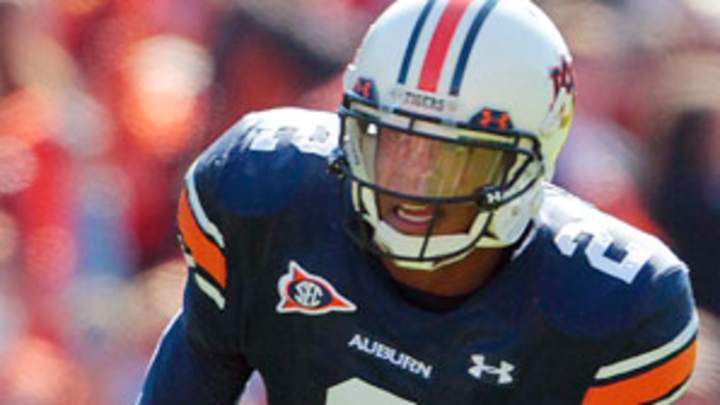Newton story takes on new life, but it's hard to know what to believe

College football has had many electrifying players, stories of redemption and disappointing scandals. What makes the Newton story different is that it combines all three. He is the Heisman Trophy favorite, a quarterback making the most of his second chance and, suddenly, the most controversial player in the sport.
We're getting to the point where, if Newton wins the Heisman, they might have to give the trophy an ankle tether. That way, the Heisman Trust will know where to find it if they decide to repossess. Newton will, instantly, be the most controversial Heisman winner ever.
And yet: At the moment I'd give it to him anyway. In fact, if you block away all the noise around Newton and think about this rationally, I think you'll agree: The best thing for most of us to do is just sit back and enjoy the show. Don't judge, don't get mad, don't presume guilt and don't expect innocence.
(And please -- PLEASE -- let's not act like this is something new. Academic fraud and under-the-table payments have been staples of college football for a century. The only difference now is there are a lot more people paying attention, there is more outrage and there are ways to punish people for cheating. So you could argue that the situation has actually improved, even if it doesn't seem that way.)
I'll try to connect the dots on Newton's story here. It is a bit confusing.
1. He left Florida after getting caught with a stolen laptop, then lying about it.
2. According to Foxsports.com, he got caught cheating on his classwork three times at Florida. If he wasn't doing his own work, why did he need a stolen laptop*?
*I should probably point out here that I first used that line on Twitter. What do we make of a writer who steals his own tweet about a player stealing somebody else's work, then posts his admission as a mid-column asterisked side note, a convention he stole from SI's Joe Posnanski? The levels of intellectual theft here are extraordinary, even if the level of intellect is not.**
**Follow me at Rosenberg_Mike.
3. ESPN and The New York Times have reported that Newton's services were offered to Mississippi State for the super-low price of $180,000. It is unclear if that included sales tax or a retirement plan for Newton. ESPN also reported that the Newton family talked of a "pay-for-play" plan, citing sources who implicated both Cam's father, Cecil, Cam himself and possibly Auburn.
Mississippi State apparently said thanks, but no thanks, which makes me wonder: What percentage of Mississippi State fans are mad that their boosters refused to pay for Cam Newton? Twenty percent? Thirty? More? You can't tell me it's less than 10. I refuse to believe it.
4. Newton ended up at Auburn, where he sometimes pauses at the line of scrimmage, snaps his fingers and makes opposing defenders burst into flames, just for his own amusement. Auburn has denied any wrongdoing and has released a statement reading, in part, "CAM NEWTON IS ELIGIBLE TO PLAY FOR AUBURN AND NOT FOR YOUR SCHOOL SO TOUGH CRAP, SUCKERS."
5. Newton's father made the decision for Newton to attend Auburn instead of Mississippi State. Newton's father is the pastor of a church in Newnan, Georgia called the Holy Zion Center of Deliverance -- which, I think we can agree, is an awesome name for a church.
What we have here, at least potentially, is a pay-for-play scandal, an academic scandal and a religious scandal -- a glorious combination.
Or ... we might end up with nothing.
Right now, this story is all smoke and no fire. The stolen laptop story is pretty straightforward: player screws up, player gets another chance. We might like it or hate it, but we're used to it.
The academic cheating story is the most disturbing, at least to me, because it goes to the heart of why universities exist. According to the FoxSports.com report, Florida kept Newton on the team after he was caught cheating once. The university's code of conduct states that "the university will take severe action against dishonest students. Similarly, measures will be taken against faculty, staff and administrators who practice dishonest or demeaning behavior." He had to cheat two more times before he was scheduled to go before the school's Student Conduct Committee. He transferred to Blinn College rather than do that.
For what it's worth: This story makes complete sense. I never understood Newton's claim that he left Florida because Tim Tebow came back to school for his senior year. He has said he loved Florida. Why would you leave your position as a backup at Florida for a year so you could go to Blinn College for a year?
As for Newton supposedly being shopped for up to $200,000 ... well, nobody who follows college football is surprised. That doesn't mean Newton got paid. It means players get paid all the time.
What I find remarkable is that, if all of this is true, the under-the-table payments are what would upset people the most. I mean, yes, it is against NCAA rules. But in any other segment of society, if a college kid found a way to use his talents to bring in money to support his father's church, he would be a hero. There would be glowing newspaper profiles and probably a few humanitarian awards. If a kid does it in college football, he's a villain.
This is entertainment for us. That's why fans get mad when a player gets paid -- it means some other team was cheating. We tend not to care much about what happens to the players. Cam Newton's case, like Cam Newton himself, has just become such a big deal that it's hard to look away.
